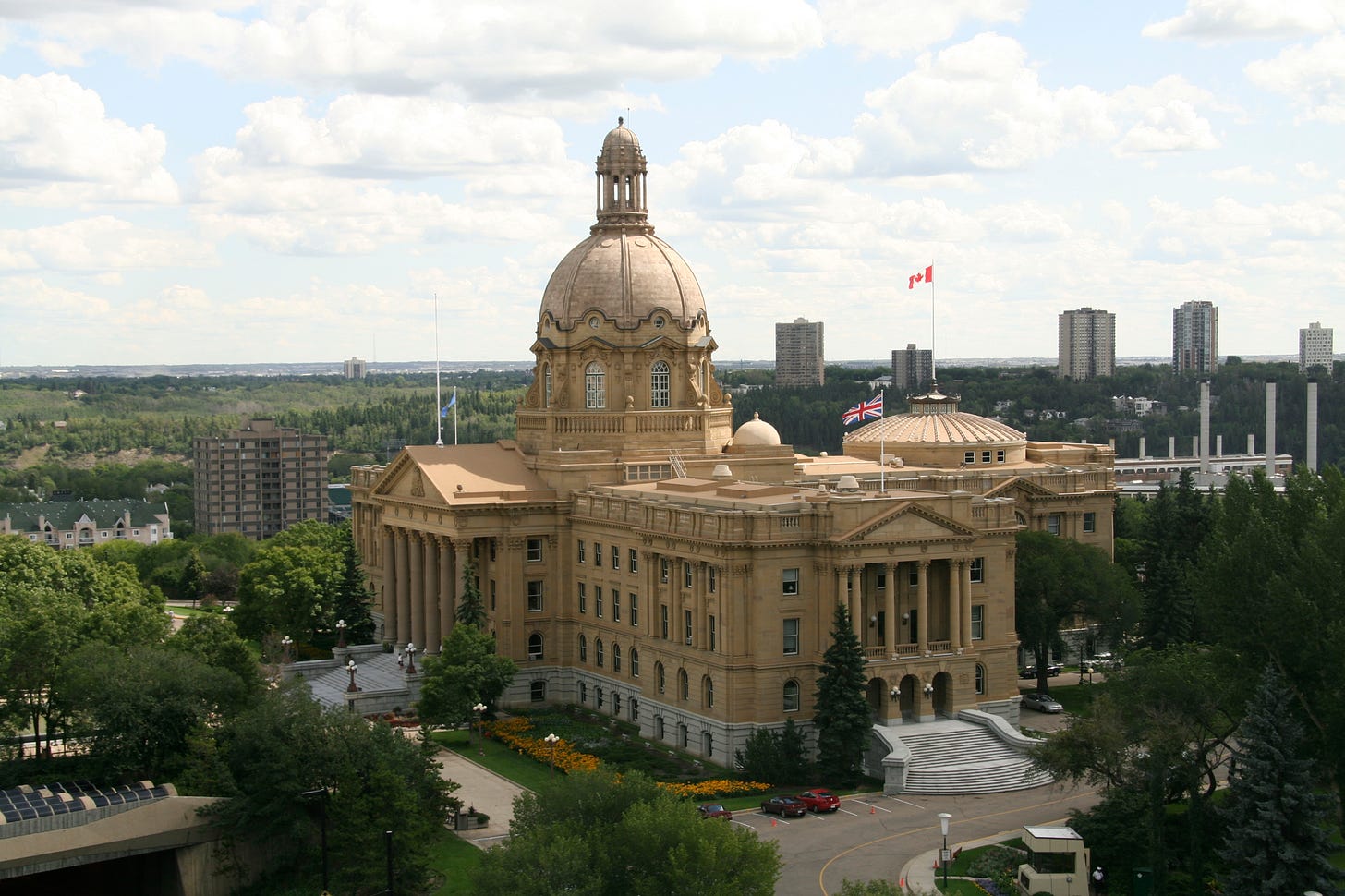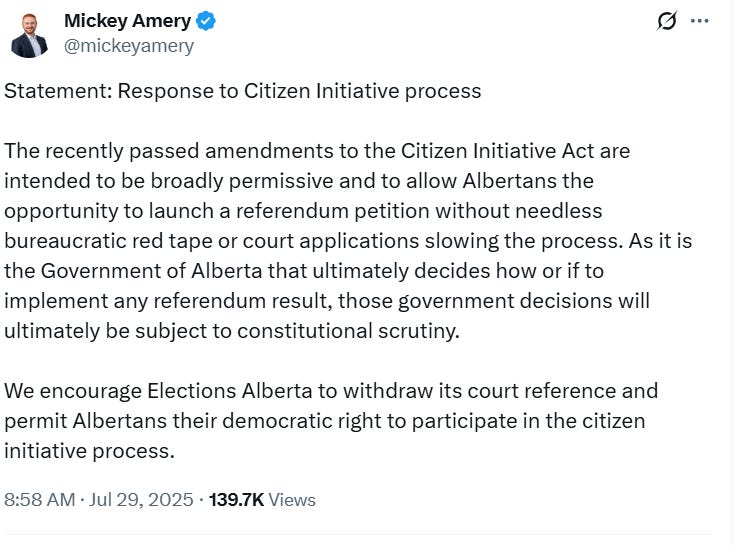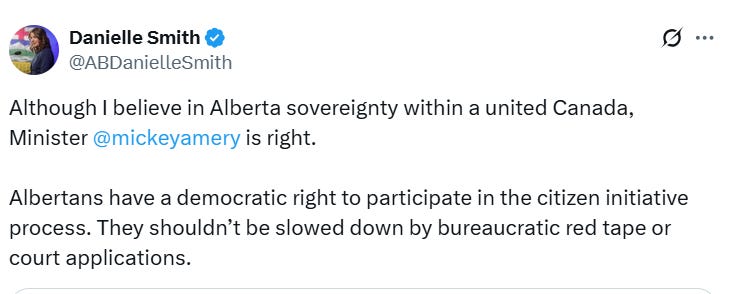Rob Breakenridge: Respect the law. Stop meddling with the referendum process.
This is all being handled as it should be. And the government isn’t happy about that.
By: Rob Breakenridge
Four years ago, then-premier Jason Kenney announced that Albertans would vote in a referendum on the federal equalization program (as well as a referendum on daylight saving time).
Current Alberta Premier Danielle Smith has promised that Albertans will be casting ballots in a referendum next year, potentially on multiple issues stemming from the Alberta Next panels (things like an Alberta Pension Plan or a provincial police force).
The point is, the Alberta government has the power to declare a referendum, if they feel that one is warranted. If Premier Smith believes that Albertans should vote on separation — and do so in a specific way — then she could make that happen tomorrow.
If, as she has stated publicly, it’s something she’d prefer to leave to citizens and the mechanisms spelled out in Alberta's citizens’ initiative legislation, then why is she so hellbent on interfering in that process?
We’ve seen two significant developments this week concerning the competing efforts to present this question to Albertans. Both of them concern decisions made by Alberta’s chief electoral officer Gordon McClure, who has a tremendous amount of responsibility here and is navigating uncharted territory.
McClure has given the official green light to the group led by former MLA and cabinet minister Thomas Lukaszuk. This is very much a pro-Canada endeavour, meant to beat the separatists at their own game by framing the question as such: “Do you agree that Alberta should remain in Canada?”
They must now collect 293,976 signatures (as in, actual pen-and-paper signatures) by October 28th. If they succeed, that closes the door on any other petition as the law stipulates that there cannot be two questions on the same issue.
As for the other petition effort, that of Mitch Silvestre and the separatist Alberta Prosperity Project (APP), the chief electoral officer has decided to refer that matter to the Court of King’s Bench. In a statement, McClure notes the need to ensure the proposal “conforms with the requirements” of Alberta’s law.
The APP’s proposed question would be: “Do you agree that the Province of Alberta shall become a sovereign country and cease to be a province in Canada?”
The court could theoretically reject the question altogether. If nothing else, though, this reference will take some time. All of that seems to have greatly frustrated the separatists. That doesn’t necessarily make it the Alberta government’s problem, but the premier’s deep aversion to antagonizing separatists has prompted her to take up their cause here.
The premier really doesn’t owe the separatists any more favours. She has already amended the legislation to lower the threshold for triggering a referendum and timed it in a way so that the pro-Canada side would be stuck operating under the old rules. Yet, now she’s asking the chief electoral officer to refrain from following the law that was written and passed by Smith’s own government.
The Citizen Initiative Act stipulates that “an initiative petition proposal must not contravene sections 1 to 35.1 of the Constitution Act.” Given that the chief electoral officer is hardly the final word on what’s constitutional, the act states that, "the Chief Electoral Officer may, with respect to a (...) constitutional referendum proposal, state a question in the form of a special case to the Court seeking the opinion of the Court as to whether the proposal conforms with the requirements."
And just so everyone’s clear, the law differentiates between legislative proposals, policy proposals, and constitutional referendum proposals. The APP has made clear that their effort is a constitutional question, thus distinguishing it from Lukaszuk’s effort (which is a policy question). So there’s no double standard here, since there’s no need for a court reference on a non-constitutional question.
In other words, this is all being handled as it should be. And the government isn’t happy about that.
First it was Justice Minister Mickey Amery, taking to social media to “encourage Elections Alberta to withdraw its court reference and permit Albertans their democratic right to participate in the citizen initiative process.”
That was echoed by the premier, who posted her own statement agreeing with her minister and declaring that “Albertans have a democratic right to participate in the citizen initiative process. They shouldn’t be slowed down by bureaucratic red tape or court applications.”
Again, both the constitutional requirements and the court reference provision were put there by this government. It’s weird that they would now characterize it as “bureaucratic red tape.” The reference itself in no way erodes or removes anybody’s democratic rights.
The law precludes an unconstitutional question from being asked in a referendum, which seems like an obvious bar to set. The premier and the justice minister are well aware of this, since they made it so.
The good news is that “the democratic right to participate in the citizen initiative process” is alive and well, since Elections Alberta has cleared the way for a citizens’ initiative petition. It may not be the one the separatists wanted, but it’s unclear why that should trouble the premier to such an extent.
Rob Breakenridge is a Calgary-based podcaster and writer and, host of The Line: Alberta Podcast. He can be found at robbreakenridge.ca and and reached at rob.breakenridge@gmail.com.
The Line: Alberta is a provincial bureau of The Line, edited by Jen Gerson and Matt Gurney. Email us at alberta@readtheline.ca.
Please follow us on social media. Facebook x 2: On The Line Podcast here, and The Line Podcast here. Instagram. TikTok. BlueSky. LinkedIn. Matt’s Twitter. The Line’s Twitter. Jen’s Twitter.





Well well. It looks like Breakenridge and the NDP have been deprived of complaining about the question. And also deprived of complaining about the process, since their complaint was that the new process required fewer signatures, and now the extant question will be posed under the old rules if sufficient signatures are obtained.
When politicians like the NDP are desperate for something to complain about sometimes they ignore that due process is continuing, in this case on a question that was already proposed. The NDP wasted a lot of public space on what is now hot air and wasted money and time, not to mention the blow to their credibility.